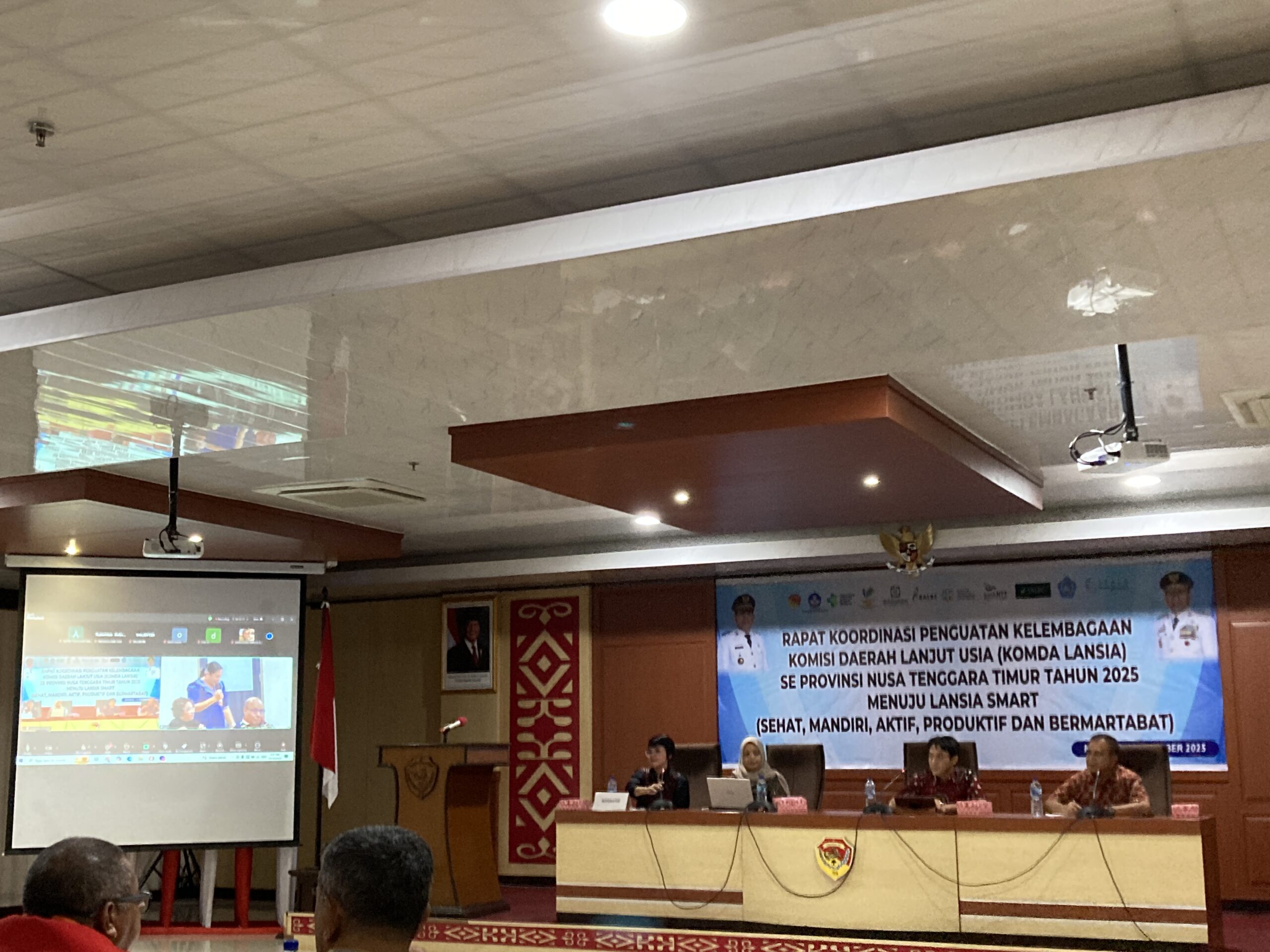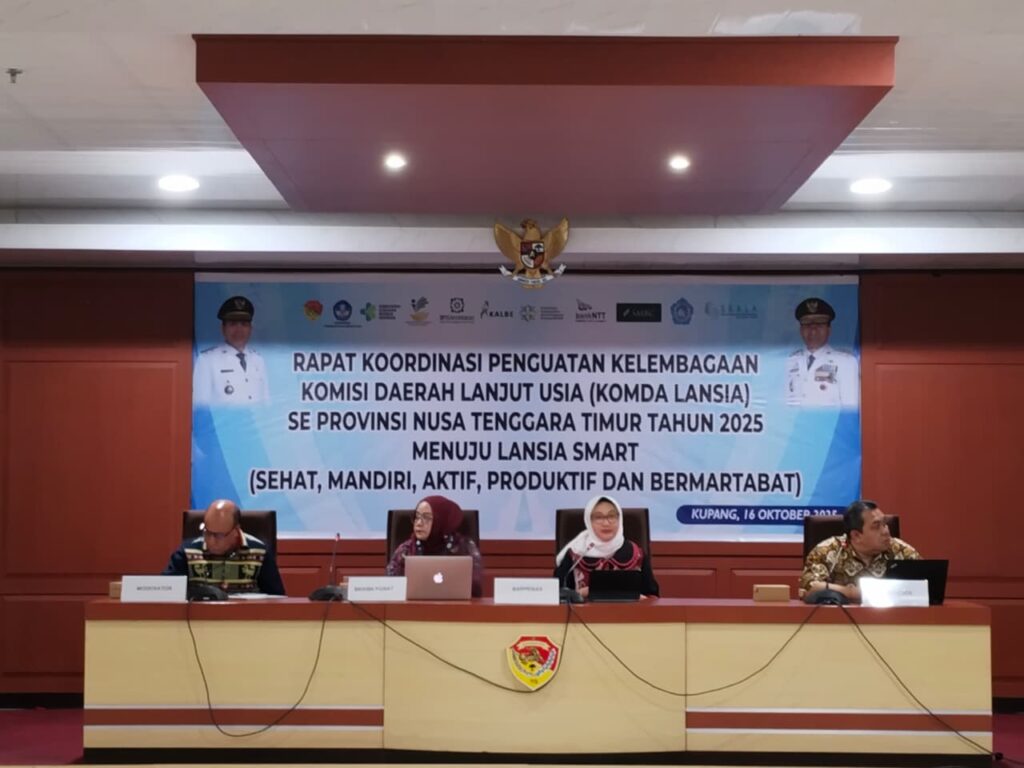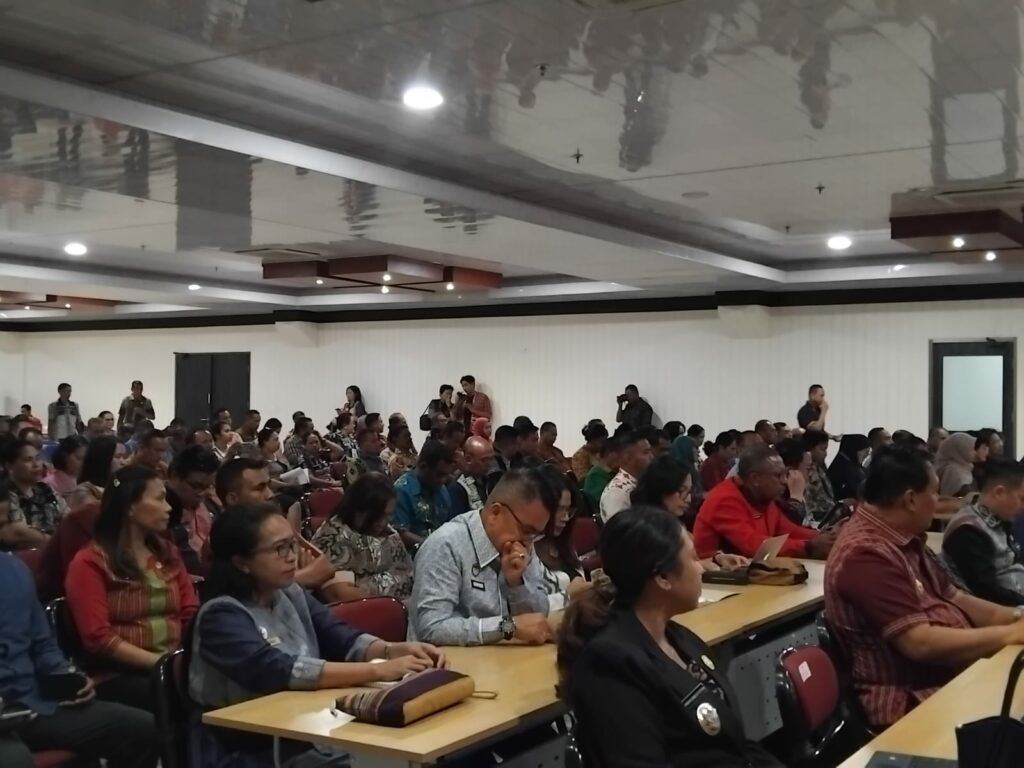Policy Synergy for Ageing: Strengthening Komda Lansia in East Nusa Tenggara

The Provincial Government of East Nusa Tenggara (NTT) is reinforcing its commitment to the well-being of ageing communities through institutional strengthening and cross-sector coordination. One of the key efforts is organising the Coordination Meeting on Strengthening the Regional Commission on Older Persons (Komda Lansia) of NTT Province, held in Kupang on 16 October 2025. The meeting is a critical step to ensure the fulfilment of older persons’ rights to basic services in a systematic, planned, and sustainable manner within an inclusive regional development framework.
Head of the Regional Development Planning, Research, and Innovation Agency (Bapperida) of NTT, Dr. Alfons Theodorus, representing the Deputy Governor of NTT as Chair of Komda Lansia, opened the meeting by emphasising the importance of government preparedness in responding to the dynamics of population ageing in the province.
“Ageing is inevitable, so we must be prepared. However, we can ensure that the rights of older persons to well-being and access to basic services are upheld,” Dr. Alfons said.
The coordination meeting, held in a hybrid format at Fernandez Hall in the Sasando Building, featured speakers from the Ministry of National Development Planning (Bappenas), the Ministry of Home Affairs, the Ministry of Social Affairs, the Ministry of Population and Family Development (Kemendukbangga), and the National Population and Family Planning Agency (BKKBN).
Around 250 people attended the meeting, among them members of the Regional Leadership Communication Forum (Forkopimda), consisting of deputy mayors and deputy regents from 20 cities and regencies. Other participants included NTT government agencies, organisations for older persons, organisations for persons with disabilities, civil society organisations and representatives from SKALA partner provinces, who joined the meeting online.
In this event, the Directorate of Poverty Alleviation and Social Welfare (PKKS) of Bappenas, also shared lessons from the Integrated Older Persons Services (Layanan Lansia Terintegrasi/LLT) pilot in Yogyakarta City and Gianyar Regency to promote replication in other cities and regencies.
An Ageing Population and the Need for Basic Services
Older persons now account for 10.06 per cent of NTT’s total population, with the largest concentrations found in Kupang, Sikka and Timor Tengah Selatan. This trend is not unique to NTT. According to data from Susenas, 12 per cent of Indonesia’s population is aged sixty and over, meaning one in five Indonesians is now an older person.
As their health declines, older persons have distinct needs and face specific risks. It is crucial that services and opportunities remain accessible to them. The LLT workshop and learning forum could not be more timely or urgent.
“This forum serves as a space to build common understanding and strengthen shared commitment to help older citizens stay active, healthy, and independent. It also encourages city and regency governments to take a stronger role in advancing the national agenda for the wellbeing of older persons,” Dr. Alfons said.
Indonesia’s ageing population presents major challenges. Older persons continue to experience health limitations, economic vulnerability and unequal access to opportunities. Policy Analyst from the Ministry of Home Affairs, Jodi Frency, said that many older persons, especially those in the lowest 40 per cent income group, still struggle to afford proper healthcare. In 2024, approximately 55 per cent of older adults in this group chose to self-medication instead of seeking formal medical treatment.
In addition, older persons tend to earn less as their productive years fade. Their average monthly income is around IDR2.07, and women earn less than men.
“Decent work and equal opportunities must remain open for older persons so they can continue to participate economically and maintain their independence,” Frency said.
Caring for Our Older Persons: From Policy to Practice
Director of Poverty Alleviation and Social Welfare at Bappenas, Tirta Sutedjo, said that by 2045, more than 20 per cent of Indonesia’s population will be older persons. This demographic shift calls for stronger access to health services, economic security, social welfare, and long-term care.
To address these challenges, the government introduced the National Strategy on Ageing under Presidential Regulation Number 88 of 2021. The strategy aims to enable older persons to live independently and to enjoy a decent quality of life with respect and dignity. It focuses on access to social protection, stronger institutions and communities, lifelong learning, and community-based care programs close to where people live.
“The National Strategy on Ageing reflects our commitment to uphold the rights and meet the needs of older persons. It relies on collaboration across sectors to ensure that older persons are not only cared for, but also able to live with purpose and dignity,” Tirta said.
As part of this effort, Bappenas piloted the LLT model. The LLT model provides coordinated health, social, and community support through an integrated team. It is based on the principle of ageing in place, which enables older persons to remain active within their communities and makes better use of existing services rather than creating new structures.
This principle is relevant in Indonesia, where many older persons still live with their families. In NTT, almost half of older persons live in three-generation households with their children and grandchildren. These patterns show that family and community remain central in care for older persons, which makes the ageing in place approach both practical and culturally responsive.
At the forum, local governments from Yogyakarta and Bali shared their experiences in implementation of the LLT model as a community-based service. Their examples show that each region must adapt the model to its own context, capacity, and resources. The success of this approach depends on local institutions and community organisations that work together from the outset, supported by capable and committed individuals.
In addition to the LLT program, the Government of Indonesia has implemented other programs for older persons, such as SIDAYA, managed by Kemendukbangga, the Social Rehabilitation Assistance for Older Persons (ATENSI), and the Food Assistance for Older Persons Living Alone program managed by the Ministry of Social Affairs.
During this coordination meeting, a memorandum of understanding was also signed between the Provincial Komda Lansia and the deputy mayors/regents of 20 cities/regencies in NTT Province. Each representative is encouraged to follow up through their respective regency and city commissions and to keep these commissions active in every area.
The success of this effort requires local commitment and collaboration among many stakeholders. Pilot projects and replication in different areas will help identify models of care that deliver real impact. Every hand must be on deck to turn the challenge of ageing into a golden stage of life, one that is healthy, independent, active, productive, and dignified (Sehat, Mandiri, Aktif, Produktif, Bermartabat /SMART). This activity signifies collaboration between national and subnational governments and development partners to develop a more integrated service model for older persons in Indonesia.
Watch the full event documentation here:








